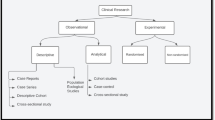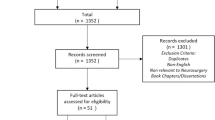Abstract
Background
Although the randomized controlled trial (RCT) is a major methodological breakthrough extending the limits of objectivity in clinical medical science, clinical trials of surgery have seldom included placebo surgery as a control, for ethical reasons. Especially in clinical studies intended eventually to establish a new intervention for developmental conditions, it has been recognized that there is huge examiner bias. In addition, the many miraculous cases that have been reported in nonsurgical open trials for developmental conditions and have eventually been evaluated as nonspecific positive outcomes in RCTs suggest that empirically promising interventions must be subjected to scientific scrutiny as soon as possible in the field of developmental conditions.
Application to pediatric neurosurgery
Therefore, in childhood neurosurgery, clinical studies to establish a new therapeutic measure for developmental conditions should be designed as rigorously as possible using optimized scientific methods. The worldwide ethical guideline, the Declaration of Helsinki issued by the World Medical Association, can provide principles for the establishment of a new intervention in the treatment of a patient when proven therapeutic methods do not exist or methods used thus far have been ineffective. Physicians’ discretion to use unproven or new therapeutic measures for such patients is approved in the presence of efforts of an ethical and scientific approach. Even if the measure is a very promising intervention, the research aspects must completely be demonstrated for informed consent and review by the ethical committee and the trial must be regarded as a clinical research. Especially when an RCT is not possible for ethical reasons, appropriate epidemiological data or animal experiments should suggest that the new measure is effective before a clinical trial. In a clinical setting, where neither epidemiological studies nor animal experimentation can be introduced, if necessary the researcher should collaborate with experts to obtain multidisciplinary justification for clinical testing.
Similar content being viewed by others
References
Bolton G (2003) Medicine, the arts, and the humanities. Lancet 362:93–94
Bourke B, Drumm B (2002) Cochrane’s epitaph for cisapride in childhood gastro-oesophageal reflux. Arch Dis Child 86:71–72
Diggle T, McConachie HR, Randle VRL (2003) Parent-mediated early intervention for young children with autism spectrum disorder. Cochrane Database Systematic Reviews 1:CD003496
Dunn-Geier J, Ho HH, Auersperg E, Doyle D, Eaves L, Matsuba C, Orrbine E, Pham B, Whiting S (2000) Effect of secretin on children with autism: a randomized controlled trial. Dev Med Child Neurol 42:796–802
Green J, Britten N (1998) Qualitative research and evidence based medicine. BMJ 316:1230–1232
Greenhalgh T (1997) How to read a paper: assessing the methodological quality of published papers. BMJ 315:305–308
Greenhalgh T (1999) Narrative based medicine: narrative based medicine in an evidence based world. BMJ 318:323–325
Griffiths KM, Christensen H (2000) Quality of web based information on treatment of depression: cross sectional survey. BMJ 321:1511–1515
Hey E (2002) Clinical trials: when to start and when to stop. Lancet 359:1449
Horng S, Miller FG (2002) Is placebo surgery unethical? N Engl J Med 347:137–139
Ijichi S, Ijichi N (2002) Ignorance of Helsinki Declaration. Lancet 360:415
Ijichi S, Ijichi N (2003) Beyond negative data in autism randomized trials. Autism: in press
Kwon HJ, Cote TR, Cuffe MS, Kramer JM, Braun MM (2003) Case reports of heart failure after therapy with a tumor necrosis factor antagonist. Ann Intern Med 138:807–811
Lang DA, Neil-Dwyer G (2001) Principles and problems of assessing the results of medical treatment. Acta Neurochir Suppl 78:59–62
Lord C, Cook EH, Leventhal BL, Amaral DG (2000) Autism spectrum disorders. Neuron 28:355–363
Meakins JL (2002) Innovation in surgery: the rules of evidence. Am J Surg 183:399–405
Nakane Y (1995) Pharmacotherapy of mental disorders in childhood and adolescence. Korean J Psychopharmacol 6:111–125
Rosselli D, Otero A (2002) The case report is far from dead (Letter). Lancet 359:84
Schrot R, Muizelaar JP (2002) Mannitol in acute traumatic brain injury. Lancet 359:1633–1634
Author information
Authors and Affiliations
Corresponding author
Rights and permissions
About this article
Cite this article
Ijichi, S., Ijichi, N. The scientific establishment of a new therapeutic intervention for developmental conditions: practical and ethical principles. Childs Nerv Syst 19, 711–715 (2003). https://doi.org/10.1007/s00381-003-0846-6
Received:
Published:
Issue Date:
DOI: https://doi.org/10.1007/s00381-003-0846-6




